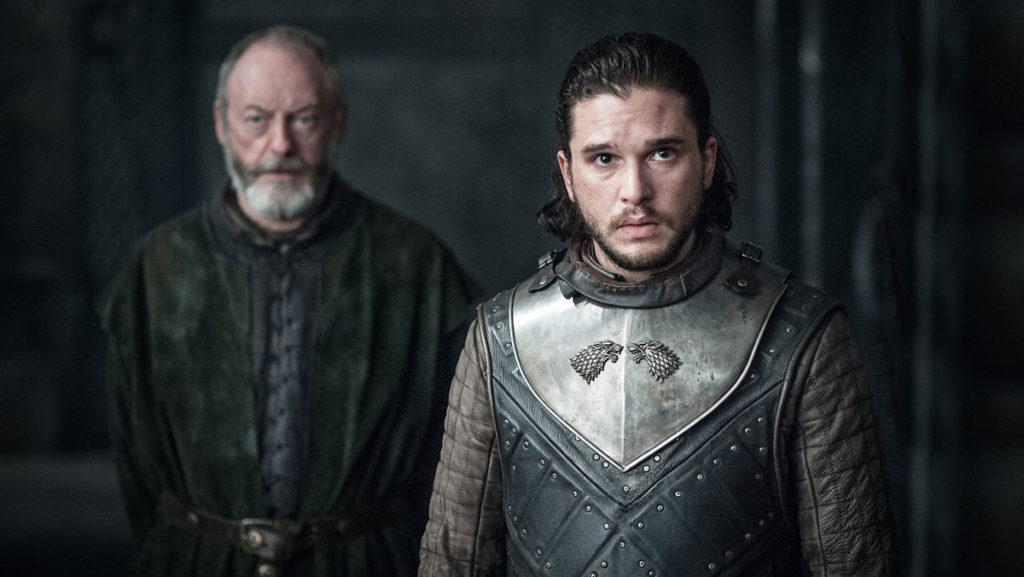It’s a peaceful day as Jaime Lannister (Nikolaj Coster-Waldau) leads a convoy back to King’s Landing. Suddenly, a low rumble builds in the background. Everyone turns to see a huge Dothraki horde charging right at them… oh, and they brought a dragon.
The latest season of “Game of Thrones” starts with Jon Snow (Kit Harington) as the King in the North. Jon’s ascent to power culminated with an invitation to meet with Daenerys Targaryen (Emilia Clarke), who just reached Westeros. Jon leaves to meet Daenerys, placing his sister Sansa in charge of the North. Soon after he leaves, his other sister Arya (Maisie Williams) appears in Winterfell.
From here, the plot diverges into three major stories: Jon trying to convince Daenerys of the existence of White Walkers as she attempts to conquer Westeros, Cersei (Lena Headey) protecting her position as queen and Arya clashing with Sansa (Sophie Turner) over what to do in Jon’s absence.
Arya and Sansa’s conflict is the briefest of the three major stories, which is a good thing. Their scenes go by quickly enough to keep the intrigue without becoming boring. Occasionally, Sansa and Arya act out of character, but the whole ordeal wraps up in a satisfying way that will hopefully have real, tangible consequences for the final season.
The most engaging plotline centers on Cersei and her reckless scheming to retain the throne. While many of her moments are marred by plotholes, Lena Headey is terrifying in the role, becoming more sadistic and paranoid than ever, rendering these missteps forgivable. The relationship between Cersei and Jaime continues to be one of the best elements of the show. The constant tension and attraction between these two deeply broken people never fails to be fascinating.
However, the main focus of this season is Jon and Daenerys’ journey. Unfortunately, while it’s satisfying to see these characters meet and form a bond, these plot threads are still the most flawed part of the show. It all comes down to pacing and characterization. This season races by at a breakneck pace. The side effect of season seven’s speedy storytelling is it feels like characters teleport through Westeros. Major players embark on voyages that should take months and arrive at their destinations in days. And viewers are asked to simply ignore it. The problem is that the cornerstone of this show used to be its internal consistency and unpredictable plot twists. Now, with shocking regularity, the logic of the show is broken, effectively destroying audience trust that’s been built up over several years. For example, earlier seasons put a great focus on the importance of maintaining a happy populace to keep power. In this new season, that element has become such a non-issue, that Cersei can blowup up the whole Sept of Baelor, and the common folk don’t seem upset by it.
On the other hand, this season has several incredible action sequences that are better executed and more exciting than ones found in most modern blockbusters. The problem is almost none of these scenes have tangible ramifications for our heroes, breaking one of the core tenets of the show.
While it’s fun to watch such a high–budget, fast–paced, expansive fantasy story, it’s a shame the show lost its moral complexity and intrigue in favor of action. It’s hard to say if this is the direction showrunners Dan Benioff and D.B. Weiss took the show independently. It could’ve been George R.R. Martin’s intention all along, but given that the book series remains unfinished, it will be a long time before anyone finds out. Either way, it feels like many of the promises to subvert the cliches of the fantasy genre were empty after all.
To reiterate, this is still enjoyable television. The episodes are interesting and move at a brisk pace. Unfortunately, they’re also built on a foundation of plot holes, causing everything to collapse. The most egregious example happens later in the season when the audience is asked to believe Daenerys can fly across the entire continent in less than a single day.
Many of these issues aren’t as apparent in the final episode of the season. Due to its focus on character development over high–stakes action, the finale is easily the best episode of the season. It was also able to recapture that sense of weight and realism this show used to excel at creating. Hopefully, this is a trend that will continue next season.
The seventh season of “Game of Thrones” is a lot like eating a full party-sized bag of potato chips while lying on the floor. It’s enjoyable at the time, but only leaves one feeling disappointed. In a way, many of the shortcomings of this season could be redeemed by the upcoming final season. However, the show could only save itself if the ending is as engaging and challenging as “Game of Thrones” used to be.




















